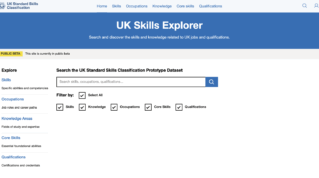Without high-quality teaching, solving the skills challenge is just a pipedream, writes David Russell
Last week saw a range of sector leaders give their expert analysis in FE Week on the Skills for Jobs white paper, exactly one year on. The tone ranged from raging enthusiasm, through cautious optimism to disappointment at lack of progress.
But one thing they all had in common was what they missed – that the truly revolutionary part of the white paper was not the latest proposals for funding rules or employer forums. Rather, it was revolutionary simply because of the fact that it took the profession of teaching in FE seriously, and backed that up with concrete policy ideas.
Bringing the best into FE
Without high-quality teachers and teaching, we cannot expect high-quality learning outcomes.
The Department for Education recruitment campaign launched last week is a welcome recognition of the vital role that experienced industry professionals make in training and inspiring learners.
However, its success will rely on a comprehensive pathway of support to ensure we hold on to those talented people we attract into the sector. The campaign also has to be a clarion call for the importance of high-quality teaching.
We must ensure we hold on to those talented people we attract in
The white paper described ‘Taking Teaching Further’, an initiative to attract high-quality teaching professionals from industry into FE and training, as a “flagship programme”.
And rightly so. This national initiative, designed and delivered by the ETF, has grown rapidly in scale, increasing the number of places from 50 to 550 between 2018 and 2020.
At the same time, the ETF’s ‘Talent to Teach’ programme, also highlighted within the white paper, aims to offer a taster of further education teaching to university students and graduates.
We have seen how Teach First has brought some of the brightest and best into schools, and that is very much the ambition of Talent to Teach for colleges.
These programmes, alongside a whole package of development opportunities offered through the ETF (from high-quality training and mentoring to continuous professional development) are helping to boost early career retention.
Meeting the skills challenge
So one year on from the white paper, why does all this activity matter?
There are five significant societal and economic developments that highlight the absolutely critical nature of FE and training in the years to come.
Firstly, the global pandemic has led to increased public expenditure (and debt), an increase in the cost of living and significant job displacement.
Secondly, Brexit has shifted our economic, regulatory and trade model. This has also led to a reduction in migrant labour in certain sectors of the economy.
Thirdly, rapid technological change could lead to a host of jobs becoming automated in whole or in part, alongside advances in areas such as artificial intelligence and robotics.
Fourthly, the government’s 2050 net zero target requires seismic shifts in a whole range of sectors, from energy production to transport and manufacturing. It will also inevitably lead to workers in certain sectors, such as oil and gas, needing to reskill.
And finally, the productivity puzzle. There are several reasons why our country is behind other nations. But it is no coincidence that we score very poorly on the proportion of the workforce with higher-level technical qualifications and on basic skills for adults.
There is a common thread among all of these – the country urgently needs more highly skilled people working in the key sectors of the future. This will enable us to be innovative, competitive and more socially mobile.
But – without high-quality teaching in further education – such ambitions will be no more than a pipe dream.











If you want to attract and retain teachers in FE colleges the pay needs to be comparable with that in schools (and industry?).